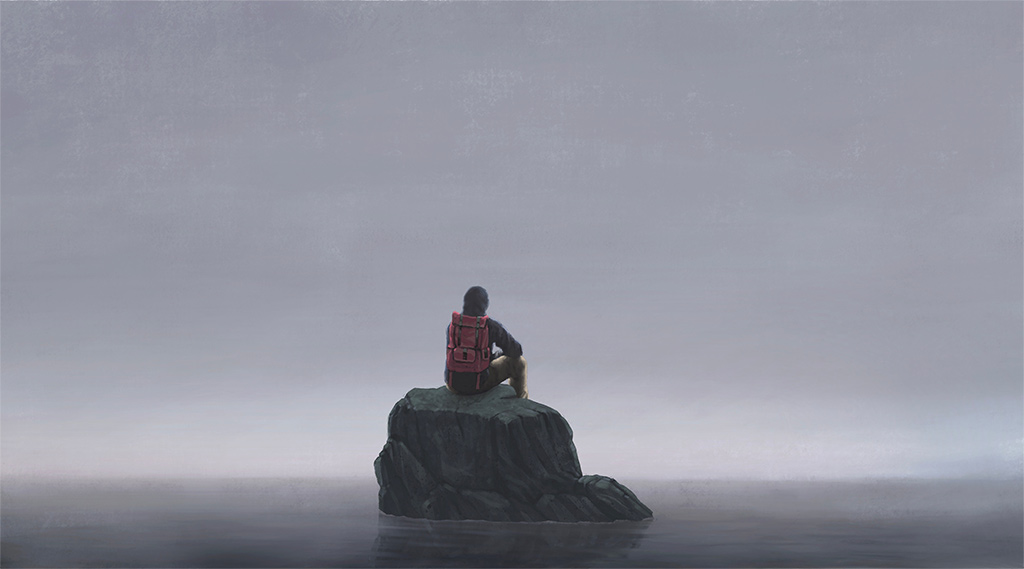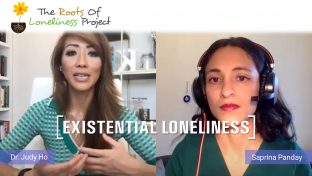Solitude Vs. Loneliness: How To Be Alone Without Feeling Lonely

Whether you’ve been feeling lonely as a result of imposed or chosen solitude, you are far from being alone.
- After the pandemic, 67.7% of those who lived alone felt somewhat or much lonelier due to the imposed solitude.
- Where loneliness and isolation are generally not desired states because they both leave a person wanting more connection with others, solitude enables a person to be alone with themselves while enjoying their own company.
- Regardless of what state of solitude you are in, building connections with others requires an investment of time, energy, and attention to improve your general sense of well-being.
- The best way to practice solitude is by making it productive in some way, whether it is a means of boosting your creativity or simply fostering a better relationship with yourself.
Struggling with loneliness or having a mental health crisis?
- Suicide Prevention Lifeline: 1-800-273-TALK (8255); Deaf or hard of hearing dial 711 before the number or connect via online chat
As someone prone to anxiety and stress, I have actively sought out solitude in the form of meditation retreats at various locations.
I thought they’d empower me to take better care of my mental health without relying upon external validation from anyone.
My last retreat in Burma took place in the middle of a creature-infested forest with huge, poisonous-looking snakes. I slept in a room that was home to tropical-sized cockroaches that I was not permitted to kill.
As you can probably imagine, when I emerged from my solitude 10 days later, I felt like Superwoman.
My will was so much stronger than I had ever imagined. My confidence grew from this experience, serving as a reminder that I can, and will, be okay alone.
While I’m quite comfortable now in chosen solitude, I have a much more difficult time when solitude is imposed by external circumstances — and that’s the primary difference when trying to understand solitude vs. loneliness, and social isolation.
They are distinct from each other and can sometimes be confused.
During the coronavirus lockdown, for instance, I worked in front of a computer all day long. I had no interaction with anyone and it was as isolating and lonely as those retreats were — if not more — for different reasons.
I wasn’t the only one feeling lonely from a lack of social interaction, however.
This forced solitude was the shared experience of many who participated in The Roots Of Loneliness Project’s COVID-19 survey during the early months of the pandemic.
Before the pandemic, 28.9% of those who lived alone reported struggling with loneliness.
Echoing my own experience with involuntary solitude during the pandemic, almost 60% of respondents reported that what they missed the most was being with friends and family who didn’t live with them.
One responder poignantly said, “I like being a hermit and isolating myself a lot. Now that I don’t have the freedom to see family and friends I care about, the isolation can feel like I’m struggling to breathe.”
Let’s explore how solitude, loneliness, and isolation relate to each other, and how you can cope with unwanted feelings of loneliness and solitude.
What Is The Difference Between Solitude, Loneliness, And Isolation?

While some may believe that loneliness, solitude, and isolation are the exact same thing, there are key differences between the three states.
- What Is Loneliness?
Loneliness is a feeling, an emotion, and perception of a general sense of lacking connection or belonging, while also desiring more connection with others than one actually has.
- What Is Solitude?
In stark contrast, solitude is the objective state of being physically alone, which is usually accompanied by the subjective experience of enjoying one’s own company.
- What Is Isolation?
Isolation is the state of being physically alone and lacking contact with others, whether by choice or extenuating circumstances such as old age, ill physical or mental health, lack of transportation, or even quarantine.
- How Are Loneliness, Solitude, And Isolation Connected?
While both solitude and loneliness can occur as a result of being alone — i.e., being physically isolated from others — loneliness has been described by psychologists and social neuroscientists as painful isolation.
Solitude, on the other hand, is qualified as desired isolation.
Clearly, one state is much more appealing than the other.
Loneliness, solitude, and isolation may seem very similar to one another, but they are not identical.
The Pros And Cons Of Solitude

Solitude is certainly not always a bad thing. In fact, it can often be a great experience for several reasons.
What Are The Pros Of Solitude?
According to recent research, solitude allows us to emotionally self-regulate by providing us with a way to pause all the noise, giving us the means to process all the things that often overwhelm us.
Other benefits of solitude include opportunities for:
- Calmness and clarity
- Productivity
- Concentration
- Problem-solving
- Mental replenishment
- Self-discovery
Paradoxically, however, solitude can also create feelings of loneliness, boredom, and other unpleasant emotions.
For our nervous system, solitude acts as a de-activator that takes us from a high arousal state that can be either positive or negative, to a low arousal state, which can also be either positive or negative.
For example, we could go from being angry about something (a negative high arousal state) to feeling very calm (a positive low arousal state).
Or, we may transition from feeling very excited (a positive high arousal state) to being lonely or bored (a negative low arousal state).
In addition, solitude also tends to increase our low affective arousal state, which is why you may find yourself feeling very lonely.
So don’t be surprised if you discover that solitude is not as peaceful as you thought it would be.
At the same time, it’s important to understand that while the experience may not be pleasant, studies strongly suggest that choosing to experience solitude regularly is good for your long-term health.
What Are The Cons Of Solitude?
On the other hand, when solitude is not desired or is the result of avoidant behavior due to dissatisfaction with the relationships one has with others, solitude can lead to chronic loneliness.
Chronic loneliness is a constant and unrelenting feeling of being alone and disconnected from others, accompanied by the perception that one will never be able to connect with others on the level one wishes to.
It is also common to have feelings of inadequacy (“I’m not enough”), low self-esteem, and self-loathing when dealing with chronic loneliness.
This is not only detrimental to one’s mental and physical health but can also be difficult to overcome because one’s social resources and support system are scarce.
Why Is Solitude Important And Who Benefits From It?
Solitude means being with oneself, thereby enabling a person to cultivate a relationship with themselves.
While solitude can be useful to everyone, if you are introverted or easily experience stress from external stimuli, solitude will be especially useful to you.
It will allow you to recharge and reconnect, as opposed to feeling overwhelmed and drained.
A person can benefit from solitude when they want to:
- Know themselves better
- Boost their productivity or creativity
- Seek solutions to immediate or ongoing problems
- Formulate a life plan or choose a direction
- Develop greater self-reliance
- Gain inner clarity
While generally understood as meaning that one has to be physically isolated from others, solitude doesn’t have to be so drastic.
For example, even though I was surrounded by many human beings at the meditation retreats I attended, I was effectively alone with myself and my thoughts.
If you are not used to being alone, it’s perfectly normal to feel scared or anxious about the idea of actively choosing to be by yourself.
But remember: there is one person you are going to live with for the rest of your life — and that is you.
Being alone in solitude gives you the personal space to figure out who you are and what you are capable of.
As an example, here is a beautiful piece about several ways meaningful alone time can be achieved.
Trust me — you will not be the same once your inner voice is speaking louder than all the noise that surrounds you on your journey toward embracing solitude.
Solitude can provide calmness and clarity, increase your productivity and concentration, and can provide mental replenishment while allowing for self-discovery.
That said, too much solitude can also create feelings of loneliness or lead to chronic loneliness over time. Still, solitude can help you to build a better relationship with yourself and figure out who you are.
How To Be Solitary Without Being Lonely

While solitude can have many benefits as we discussed above, it shouldn’t be used as a means of running away from emotional connections with others.
While it can feel good to have time alone to be productive, solitude in and of itself cannot replace or fix the longing that lonely people have for a deep emotional connection with others, which is a basic human need.
Your solitude is about building your relationship with yourself.
A desire for more connection with others — loneliness — can crop up at any age, stage, or phase in our life and its salve is sharing emotional connections with others.
According to loneliness expert, Dr. Holt-Lunstad, the quality and quantity of our relationships directly impact how lonely we feel.
The more diverse our relationships are with the different people in our lives, the more we feel connected, needed, and meaningful.
So rather than investing only in your solitude, make sure to also invest in creating relationships that make you feel fully heard and connected with others.
It’s also important to know when to break out of your solitude.
After working remotely from home for a couple of years, I got used to spending a lot of time in solitude.
I was so accustomed to it, in fact, that solitude became my comfort zone, and going out to interact with others became a challenge that I’d avoid at all costs.
And that was odd for me because I genuinely enjoyed being around people.
By spending so much time alone, however, my solitude eventually became a defense mechanism.
This is not an uncommon occurrence and it can happen to any of us.
But it’s important to remember that there is a difference between solitude and seclusion.
Rather than blindly indulging in this behavior, answer these four questions to ensure that your solitude is not harming you:
- Is your solitude voluntary?
- Can you regulate your emotions effectively?
- Can you join a social group when desired?
- Can you maintain positive relationships outside of your solitude?
If your answer to any of these questions is “no,” take steps to ensure that your solitude originates from a real desire to spend time alone and is not just a way to avoid engaging with others.
Perhaps the best method of practicing solitude is to make it productive — in whatever way benefits you the most.
As a creative person, I tend to produce my best work only when I’m in solitude, working in chosen self-isolation.
This is an experience that many other people who live very solitary lives share, too.
But that does not mean that I don’t feel lonely.
In fact, during the process of simply being in solitude, there are many times when I’ll suddenly feel a pang of loneliness or some other uncomfortable or painful emotion associated with it.
But that is normal.
According to Matthew Bowker, a psychoanalytic political theorist at Medaille College, productive solitude is not simply a peaceful experience like many people believe it to be.
Rather, productive solitude is “a deeper internal process” that can sometimes be excruciating to go through and one that takes time to become a pleasant source of self-knowledge.
So while you may find yourself struggling with the avalanche of emotions that wash over you as you remain in solitude, remember that there is nothing wrong with you.
This is just a part of the process when getting to know yourself better.
And when it gets too overwhelming, take a break and connect with someone you feel comfortable with.
There is no need to indulge in unnecessary pain to prove something to the world — or yourself.
As someone who tends to become overwhelmed by external stimuli quickly, I begin the first hour of every morning in solitude.
This is how I keep myself emotionally and spiritually balanced.
I turn off all the outside noise — phones, laptops, notifications — all of it.
Instead of giving into that relentless noise, I clean my room, express gratitude for what I have, do some yoga, and plan my day.
Doing all of this, by and for myself, makes me feel incredibly wholesome.
So if you tend to switch on your phone first thing in the morning and start scrolling away, stop doing that!
Decide that starting today, you’ll give at least the first ten minutes of every day to yourself.
Spend that time alone and tune into yourself to see how that feels. If you can, go for a walk outside and enjoy nature.
As you get more practice with the ritual of morning solitude, you can increase the amount of time and adjust your activities accordingly.
I bet you’ll love this new experience of a free and solitary existence and you won’t want to return to starting your day with your phone in hand!
Once you’ve gotten used to being in solitude, try to make it an opportunity to dive deeply and explore yourself.
You can be alone without being lonely, but you shouldn’t use solitude as a way of avoiding meaningful connections with other people.
You can begin by taking small steps each day, spending time in solitude for short amounts of time — even if it’s only ten minutes. You can gradually increase your periods of solitude as you become more comfortable with it.
How To Get Help With Feelings Of Loneliness

If you find yourself struggling with loneliness, don’t worry. You are not alone.
People who have lived in extreme isolation and loneliness have lived to tell the tale and there are ways to manage feelings of loneliness.
- Connect with other people in a positive, healthy way.
While loneliness has many factors to it, in my own life it is deeply connected to the health and strength of my relationships with others.
For a long time, I felt unhappy and lonely working for what was meant to be a very dynamic and happening company. I felt like I was around people with whom I shared no common interests or goals.
I stopped trying to connect with them.
On top of that, my close friends were busy with their own lives and so whenever I felt lonely, I would self-isolate, using that time to read, write or watch YouTube or Netflix.
After a year or so, I grew tired of being lonely and anxious.
So, I decided to join an improv group. It was not easy for me because I was nervous, stressed, and insecure. Still, I had always wanted to do improv, so it was worth a try.
After the first two weeks of awkwardness, it was amazing! I felt very connected to the people there, even though we were all very different.
The experience taught me that it is very important to connect and keep connecting with others, even when it’s not the most comfortable thing to do.
After all, that lack of connection is a huge part of why we feel lonely in the first place.
What’s more, is that simply incorporating a few hours of improv into my week spilled over onto my job.
I felt so positive and rejuvenated by the way I was able to connect with strangers, that the barriers I’d built between myself and my colleagues disappeared.
I felt much less lonely at work — and in life in general.
I would strongly suggest that you take steps to volunteer or pursue a hobby where you can meet people who share similar passions, even if those steps are hard or awkward.
I can guarantee that if you are doing the things that make you happiest, it will help to make the process of building connections with others much easier.
Additionally, having deep, meaningful connections with others while also knowing I can create them has helped me with my self-esteem. And I am sure it can help you with yours too.
Where Can You Get Help If You’re Feeling Lonely?
When I was working as a freelancer, I remember going through intense bouts of loneliness.
I wanted to connect with others, but I knew that my closest friends were simply too busy with their own lives.
And besides, I wasn’t sure that they understood what I was going through because they had regular jobs.
So I started speaking to a therapist over the phone and that made a big difference: just having someone to talk to, helped me navigate a lot of what I was feeling.
It also reminded me that I wasn’t alone.
From those weekly 30-minute conversations, I was provided with tools and goals, which included keeping a journal and monitoring my thoughts.
I came to realize that being isolated for long periods had made me less trusting and more emotional. This is a common experience for anxious people who feel lonely for long periods of time.
That meant that I needed to try harder to connect with myself through mindfulness and physical exercise while pushing myself to connect with others and tell them how I was feeling.
Having someone check on me every week and allowing me to talk honestly — without holding anything back — was very uplifting to my morale and helped me develop a routine.
I urge you to try it, too.
- If you are feeling chronically lonely, find a support group.
If you are struggling to escape from your loneliness because it’s just too hard, don’t worry. It is very difficult to break away from a habit or a state of mind that feels “safer” than the wider world.
One way of easing yourself into it is to find a support group where others can support you in your journey to where you want to be.
Hearing that other people are going through a similar struggle can be extremely empowering and can help reduce feelings of loneliness.
If you’re not ready to meet them in person, look for virtual forums where you can tune into what others are saying.
When you feel ready to do so, you can begin sharing your own experiences. And from there, when you can, try meeting people in real life.
Remember, we all need social connections in life and there is no shame or harm in looking for them.
- Make sure to be physically active and get out into the sun.
Working from home, I tended to remain indoors in front of my computer from the minute I woke up.
I began feeling very irritable and was not the best person to be around. I realized I needed to change.
I altered my routine so that going outside to get some sun and get my body moving was the first thing I did when I woke up.
Elevating endorphins and serotonin can do wonders for improving your mood and making you feel more positive.
If you’re struggling with loneliness, you can talk to an expert, positively connect with others, and stay physically active.
Those suffering from chronic loneliness may benefit from a support group. Spending time outside in the sunlight can boost serotonin and endorphins, both of which can improve a person’s outlook and general mood.
Closing Thoughts
Being in solitude doesn’t mean embracing a life full of isolation, loneliness, or depression.
Instead, it’s about taking the time to know oneself away from all the external noise.
By learning to invest time in building relationships — both with yourself and with others — solitude and loneliness will no longer be the insurmountable hurdles you may have imagined they would be.
Editor’s Note: This article is part of The Roots Of Loneliness Project, the first-of-its-kind resource that comprehensively explores the phenomenon of loneliness and over 100 types we might experience during our lives.
Find Help Now
If you’re struggling with loneliness from solitude, we’ve put together resources to meet you wherever you are — whether you want someone to talk to right now, or are looking for longer-term ways to help ease your loneliness.
- Suicide Prevention Lifeline: 1-800-273-TALK (8255); Deaf or hard of hearing dial 711 before the number or connect via online chat
- Resources & Emotional Support For Loneliness
- Volunteer & Pet Adoption Opportunities






